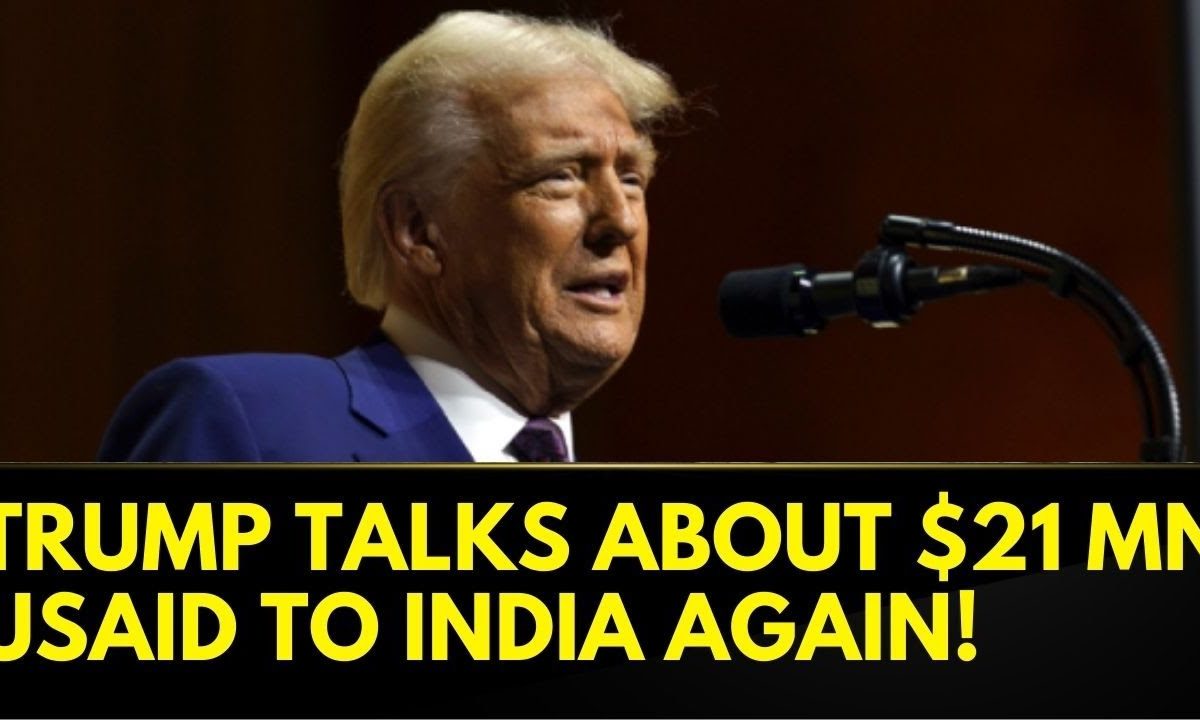The Trump administration’s decision to reveal and cancel controversial USAID funding has triggered a political storm in India. The administration has scrapped a $21 million grant allegedly allocated for “increasing voter turnout in India,” calling it a “kickback scheme.” President Donald Trump’s remarks questioning the rationale behind such expenditures have reignited debates over foreign influence in domestic affairs.
Speaking at the Republican Governors Association meeting in Washington, D.C., Trump expressed outrage over U.S. taxpayer dollars being spent on India’s electoral process. “$21 million for voter turnout in India? Why are we caring about India’s turnout? We have enough problems. We want our own turnout,” he said in a speech broadcast by NBC News.
Further fuelling controversy, Trump suggested that such funds are not genuinely used for their stated purpose but are part of a larger “kickback scheme.” “Can you imagine all that money going to India? I wonder what they think when they get it. It’s not like they spend it. They kick it back to people,” he claimed.
Trump also criticized USAID’s $29 million allocation for strengthening Bangladesh’s political landscape, questioning its necessity. “Nobody knows what they mean by ‘political landscape.’ What does that mean?” he asked. More notably, the U.S. President repeatedly claimed over the past four days that the funding to India was intended to help defeat his friend, Narendra Modi.
The U.S. government’s Office of the Inspector General confirmed the cancellation of several planned expenditures, including the disputed $21 million fund for India. “U.S. taxpayer dollars were going to be spent on the following items, all of which have been cancelled,” the agency’s statement read, specifically highlighting the voter turnout funding.

On February 20, Trump went a step further, implying that USAID funds were intended to influence India’s elections. “Why do we need to spend $21 million on voter turnout in India? I guess they were trying to get somebody else elected. This is a total breakthrough,” he said.
Drawing a comparison with concerns over foreign interference in U.S. elections, Trump remarked, “I have a lot of respect for India and Prime Minister Narendra Modi, but we’re giving $21 million for voter turnout in India. What about voter turnout here? Oh, we’ve done that, I guess. We did $500 million. It’s called the lockboxes.”
Despite Trump’s assertions, an investigation by an Indian English newspaper, which is known for its anti-Modi stance, claims that the USAID funds in question were actually intended for Bangladesh, not India. This contradicts earlier claims from both Trump and the U.S. government’s watchdog agency.
Trump’s statements have sparked political tensions in India. BJP IT cell chief Amit Malviya accused the funds of being used to support “deep-state assets” within the country. “Trump has reiterated the charge and this time, he has also mentioned kickbacks. This money is also used to sustain deep-state assets who work to defend and deflect such revelations,” Malviya alleged.
Congress spokesperson Pawan Khera, however, dismissed these claims, suggesting that the BJP itself might have benefited from foreign funding. “If despite having so many security agencies, the Modi government allowed $21 million to enter India, then it is a matter of shame. When the Modi government was asked about this, they said the money came in 2012 during the UPA regime. Did BJP win in 2014 with this money?” Khera questioned.
The controversy has renewed calls for greater transparency in foreign funding. Many are now demanding that the Trump administration reveal the recipients of USAID grants in the past, especially in light of large-scale protests in India, such as the farmer protests in Punjab, Haryana, and Uttar Pradesh, as well as the anti-CAA demonstrations in Shaheen Bagh. Questions remain about how these movements were sustained and whether foreign funds played a role.
Although Indian investigations have pointed to foreign funding behind such agitations, they have struggled to establish concrete links. With Trump’s statements coming soon after he meets with Modi, the issue has gained fresh momentum.
Given the implications, both the U.S. and Indian intelligence agencies must work closely to track the flow of these funds and identify the beneficiaries. A former diplomat, speaking in a TV interview, suggested that such funding is often funnelled through embassies, which are immune to searches and raids.
For greater accountability, not just India and the U.S., but all democratic nations must collaborate to ensure transparency in foreign funding. The sanctity of embassies should be maintained while preventing their misuse of covert financial operations.
As the controversy unfolds, the onus is now on the U.S. administration to disclose the full extent of USAID’s financial activities and for India to take proactive measures to safeguard its democratic processes from external influence.






